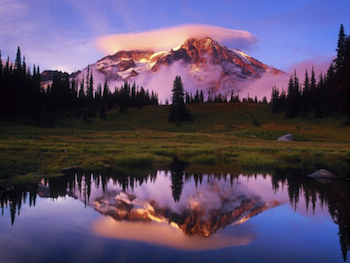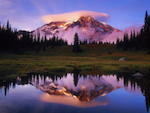Planet Waves is running a membership drive.
Read more in Solstice Fire and the Art of Service, by Eric Francis.
By Amanda Moreno
What a week — a potent New Moon and new images of Pluto, the lord of the underworld — or at least one of his masculine celestial representatives. While writing my column for last week, I had no idea Pluto and its surrounding themes, particularly the nuclear ones, would be making an appearance on the world stage. Now that I’m paying attention again, I’m delighted to see the underworld getting some airtime.

Photo by graywacke/A Landing a Day
I shouldn’t be surprised, really, that something related to nuclear power made headlines this week. The detonation of the first nuclear bomb does, of course, coincide with the ‘discovery’ of Pluto, reflecting its themes of complete destruction, chaos and volcanic eruptions from down below — be that below place the underbelly of the Earth or the unconscious.
Of course we also have an invigorated thread about underworld themes. Although I’ve enjoyed looking at the various images of Pluto, nothing has sparked excitement within me quite as much as this article, which discusses the naming of many of Pluto’s newly discovered features for creatures related to underworld mythologies. I see in that the potential for some old mythologies to re-enter the collective consciousness.
My spirituality has evolved to embrace the mythological as vital to our culture’s ability to navigate a global rite of passage. Realizing that all of those underworld mythologies are being re-animated within collective consciousness during this time is exciting to me not just because it’s all so intellectually fascinating and gives us the opportunity to actually talk and think about death, but because those images and stories get the imagination pumping.
Juicy imaginations are the key to developing a new, sustainable, global mythology or mythologies. More than that, a hearty imagination is a key ingredient in scientific breakthrough, and something we need more of if we’re going to create sustainable options for things like clean energy.
According to Joseph Campbell, “myth is the secret opening through which the inexhaustible energies of the cosmos pour into human cultural manifestation.” Underworld mythologies are particularly important because they place us in contact with the life/death/life cycle and therefore in contact with the organization of the universe.
Western culture has such a deep and profound fear of death. We constantly attempt to banish the reality of death, stripping our social, psychological and cosmological views of any recognition of this completely unavoidable facet of life. Instead of using mythology or even natural cycles to illustrate the regenerative and creative aspects of death, we act as if the death of a body is a definitive and concrete ending. It is my belief that this avoidance inhibits our ability to have healthy, transformative relationships at the soul level with other beings, with our food and surroundings, and with ourselves.
A teacher of mine often says that the human psyche is constantly throwing up seeds for a new global myth, marking the signs of spiritual revolution, and these are most often and obviously found in dreams. Dreams are the way that the psyche speaks to us, and in times of paradigm shift dream images can help us to understand how our personal unconscious speaks, elucidating our ever-shifting personal mythologies within the context of the collective.
It often seems like as we become capable of understanding our personal mythologies, whether by acknowledging past stories we’ve told ourselves, or recognizing frameworks we’re moving into, we have to encounter and experience them. We then add those stories to the deepening collective myth of the times we live in — even if we live in a culture that seems to think ‘myth’ is a synonym for ‘lie’. The beauty and the burden here lies in that as we shape these interwoven stories, we have the power to transform them.
I wonder sometimes whether we should be reworking old myths or going off on an entirely new path. It seems that in many ways, the obvious answer is that we are doing the latter, creating something completely different. Carl Jung believed that we would ultimately re-work and revitalize the Christian myth. In that sense, the nuclear myth, which seems to be the prevailing myth of our time, encompasses the Beast-Messiah complex quite nicely.
I don’t know, though. I wonder how our general cultural ambivalence towards mythology, and unconscious creation of overarching stories, increases our feelings of being acted upon by outside forces, and of being victims. I like to think we can move away from waiting for something from the outside to save us, or blaming something out there for our hurts and pains.
Perhaps all of this Pluto stuff will just fall away, with only a little ripple of collective awareness of underworld mythologies. It’s quite the dynamic, isn’t it? With the closing of the Uranus-Pluto square, I’m intrigued at the possibility of a cultural deepening. Not that I’m suggesting pictures from outer space will definitely trigger that. But I am aware that those Uranian lightning bolts and the mental trauma and liberation associated with them tend to register more quickly than the cavernous tumult of emotional Plutonian transformation. So we shall see, I suppose.


“I like to think we can move away from waiting for something from the outside to save us, or blaming something out there for our hurts and pains”.
Amen Amanda!
I think that is all we really have to finally come to terms with in order to heal – at least – to a new level of illusion; one where we are no longer reactive and will consciously create. This unconscious creation is becoming obvious and it just can not remain intact. Time is up for this dream. Bring in the new vivid ( or is it livid) dream.
I meant to say – Bring in the new vivid ( or is it lucid) dream.
Interesting slip there 😉
Thanks for the additional commentary!
“A teacher of mine often says that the human psyche is constantly throwing up seeds for a new global myth, marking the signs of spiritual revolution, and these are most often and obviously found in dreams.”
This is one of those sentences that makes me say, “hmmmm…”
I’ve often experienced personal revelations and revolutions through dreams. But I’ve never thought to connect that to “a new global myth.”
Amanda — did you teacher have anything more to say about how the “seeds” in personal dreams make their way into a collective global myth-making? Or am I just being too literal?
😉
He had tons to say about it, and co-authored a book (called Nagasaki Spirits, Hiroshima Voices) based largely on time spent living in Hiroshima, working with the dreams of survivors of the bomb and their children combined with his teaching experience in a spiritual studies program.
There’s also a man named Stephen Aizenstat who comes to mind, a depth psychologist who teaches about “dream tending” and the notion that everything is dreaming, and that sometimes the world “dreams through us.” This gets into some psychological theory that essentially claims an interconnected world, and that although images might have personal relevance, they are also connected in a larger web.
The short version is…well, that the inner and outer, personal and collective are inherently related — although it’s definitely important to emphasize that I’m not suggesting dreams be literalized or concretized. A dream about killing your neighbor would be disasterous if literalized, but examining the relationship with the neighbor from many angles, and then looking at what the neighbor represents in the individual psyche gives even more information. Kicking it up a very oversimplified notch, dreaming about an unknown, mysterious woman can give insight into the personal relationship with new sides of the feminine arising at the same time as it can reflect collectively-relevant themes about the arising feminine, maybe provoking revelation about an individual’s place in the larger world, or providing an image as example of a cultural theme.
“Revelation” is actually a great word to use – thanks for that.
From the view of depth psychology, or from the view of that Carl Jung dude, apocalyptic imagery is a call from the collective unconscious for a new mythology taking shape in the collective psyche, and the purpose of revelation is to bring about transformation — at the personal or the collective level. The images that the psyche throws up are process-oriented, as the psyche is involved in an intentional, self-regulating process that is often depicted via dreams or visions.
That’s all a bunch of abstract gobbledegook, though, and as I try to find use-friendly ways to explain the concepts, I become pretty certain I have the topic for next week’s column where I can hopefully explore it a little more coherently. Thanks for that 🙂
You’re welcome. 😉 And yes — I’m well aware that most dreams should not be concretized or literalized as in the example you give (the dream about killing one’s neighbor), but I appreciate that it’s also not necessary to concretize them in a more “global” sense for the purposes of myth-making. Assuming the collective unconscious idea is correct, it sounds from what you’ve described that it’s happening already.
Amanda: This is a masterpiece. i wish i could, appropriately and with the proper discretion express just how deeply informative, supportive, and empowering your words in this piece (and the timing of this piece) have been for me. You have been proven to be nothing less than a genius from my perspective.
Wow – thank you, Len. I would like to enthusiastically and gratefully remind you that it is only by reading through what you and the other PW writers have whipped up during the course of the week that I’m able to link into the themes and try to synthesize them in some way that makes sense to me – or at least that displays the things I don’t quite yet understand but am pondering.
Happy to be supportive, and grateful for YOUR support too!
“I wonder how our general cultural ambivalence towards mythology, and unconscious creation of overarching stories…”
It seems that our culture is unconscious of the old myths it inhabits, and the new ones it creates. With the unconsciousness there is a way the old gets twisted, and the new cannot set proper roots, and so our culture spins madly on a misaligned axis.
Perhaps that’s exactly the way we’re supposed to be spinning?
I am hoping that the visuals of Pluto coming now are a metaphor for our willingness to see the deep transformation needed to save our own skins on this planet from the Plutocratic demands to extract all for profit. I’m hoping we’re turning towards making the shifts needed to embrace the healing Plutonian themes.
I hope so, too. Very, very actively 😉